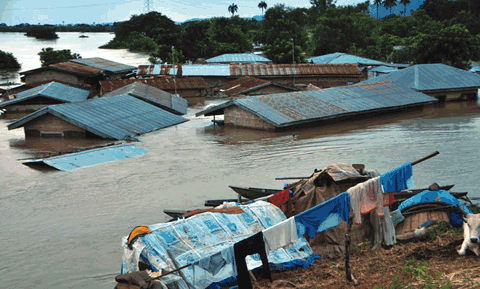National Issues
Who Will Rescue Victims Of Flood As It Continue To Rage? -By Abdulkadir Salaudeen
In a situation where government has over governed, and is tired of governance, and is eager to leave, it shouldn’t be surprising if governance is sublet to bandits, kidnappers, and terrorists. It is not also strange to find out that every minister or spokesperson becomes government themselves. This is another way to explain government existence in Nigeria if we insist it exists. Either way, Nigeria is stuck in limbo.

Rain is ever a blessing. Even when it is in excess, we still call it a blessing. This is not to say it cannot be a curse or punishment; those who are conversant with the Bible or the Qur’an can relate better. There exists in those Books an account of how the world, or some of its region, was flooded—water poured heavily from the sky and gushed from the earth.
This caused the destruction of the then existing human, but few, due to their sins. This incident is not just a religious narration that an atheist may choose not to believe. It is a historical fact.
Due to this historical event of destructive flood, people are quick to link flood to sin and expression of God’s annoyance. While God can express His annoyance in different forms, we should always give room for other explanations. Can we bear God’s annoyance? May be we don’t know it. Even if we accept flood as an expression of God’s annoyance, we should always remember that God is known for justice. One of His Names is The Just. I am writing as a Muslim and I know that in other religions (may be not all), there is common attribution of justice to God.
But when we Nigerianize God’s Justice, it seems justified to say flood is a divine punishment for poor sinners who often live in ghettoes. From that perspective of Nigerianized Justice of God, it is the norm for God not to punish the ‘pious’ rich with flood because they have the wherewithal to own houses built for the VIPs in a flood-proof environment.
Despite the Nigerian Meteorological Agency’s (NiMet) gloomy forecast of excess rain fall, there isn’t any tangible pre-emptive measures by the Government. Though this is not unusual, what is usual is to distribute mosquito nets to flood victims who were sacked from their houses and left homeless. This year, flood has destroyed thousands of houses and farms in many northern settlements and riverine areas in the South. This is not an exaggeration. I can give statistics if not for the stoppage of university lecturers’ salaries (now for seven months and still counting) to which I am a victim. I wonder why my salary was stopped for I am not on strike. Anyway, we are used to this kind of justice in this Government.
A friend, also a lecturer, who resides in one of these flooded areas told me few days ago that houses in his area are submerged. Though he was able to pick some of his belongings, many have lost their businesses, farms, and houses. The experience is nightmarish.
What is more, people are falling sick while hospitals are not approachable due to the pulverizing poverty which has reduced the basic needs of many Nigerians to only food. Even when you are fortunate to have neighbors and family members who are willing to lend you money or contribute to foot your hospital bill, there is always a fear of survival at these hospitals. Patients often suffer what people called pre-mature death—for not being attended to by health workers. This is not to say these health givers are wicked, it is because of their dearth.
Doctors and nurses are very few; their ratio to those of their patients is grossly disproportionate. These health workers at times deserve our sympathy; for even if they choose to over work themselves, as it is often the case, they still could not save many lives.
Confronted with this reality, family and friends of a patient will need to decide between risking their little savings at the hospital—with no hope of bringing their patient out alive—or keeping it to be used for the basic burial rite not to incur more debt if they pass over. It is this bad.
By modern standard, this only happens where government does not exist. If anyone argues government exists in Nigeria, then it will be a case of government’s over existence. To theorize on that, it will be a situation whereby a government is deemed to have over governed and therefore tired. If we recall, President Muhammadu Buhari of the Federal Republic of Nigeria recently said he is tired and eager to leave.
In a situation where government has over governed, and is tired of governance, and is eager to leave, it shouldn’t be surprising if governance is sublet to bandits, kidnappers, and terrorists. It is not also strange to find out that every minister or spokesperson becomes government themselves. This is another way to explain government existence in Nigeria if we insist it exists. Either way, Nigeria is stuck in limbo.
The point is the excess rainfall we witnessed in some parts of the country this year is not torrential enough to cause flood if our communities, towns and cities are well planned with good road networks that are tarred with drainages. Erecting structures on waterways and indiscriminate disposal of wastes are all contributing factors. Have you ever heard of flood in Aso Villa or in any of the highbrow areas in Abuja? This is town planning.
Not only Abuja, there is hardly any state in Nigeria or any local government that does not have such areas that are well carved out and planned. They call them Government Residential Areas (GRAs). These areas hardly experience flood. It isn’t because the residents are Godly while those in flood prone areas are sinners. It is because government decides which area should experience flood and vice versa.
It is true, in any case, that public policy is anything that government chooses to do or not to do. If government chooses to transform Ghetto Residential Areas (GRAs) otherwise known as Government Rejected Areas (GRAs) to a habitable environment—free of flood—it can do so. All government needs do is to draft a policy, finance it, and execute it. On a lighter note, and this goes to Nigerian ladies; when a man tells you he lives in GRA be careful. Make sure you verify which of the GRAs.
On a serious note, prices of foods in Nigeria after this year harvest may not witness any serious fall. The prohibitive prices of fertilizers and other farm inputs initially drove many out of farming. Cost of transportation of farm produce is another serious cause for concern.
In its recent forecast, the NiMet stated that above normal rainfall conditions were expected in the Northern States such as Adamawa, Bauchi, Borno, Gombe, Jigawa, Kano, Katsina, Kebbi, Kaduna, Sokoto, Yobe, and Zamfara. It predicted normal to above normal rainfall for most part of the South-Western states. Serious government will make use of this information as guide in making some decisions. But in Nigeria, it is meant for the newspapers.
Consequently, most communities in northern states are currently experiencing flood with its devastating effects on livelihood, habitations, and what not.
Those in the South have their share of it. So how do Nigerian masses survive these looming crisis of food shortage? We cannot all Japa (migrate), which is, of course, an option. The second option is to struggle to survive. This may sound unpleasant to many who might retort: have we not been struggling?
Yes, we have been struggling but our struggle, as it is, needs to be admixed with fatalism—a resignation to fate. That is the struggle of helpless and hapless citizens in a hopeless state. For the Nigerian well-to-do and philanthropists, it is high time to come together and help these flood victims. We ask for God’s intervention.
Abdulkadir Salaudeen
salahuddeenabdulkadir@gmail.com
@salahuddeenAbd


















